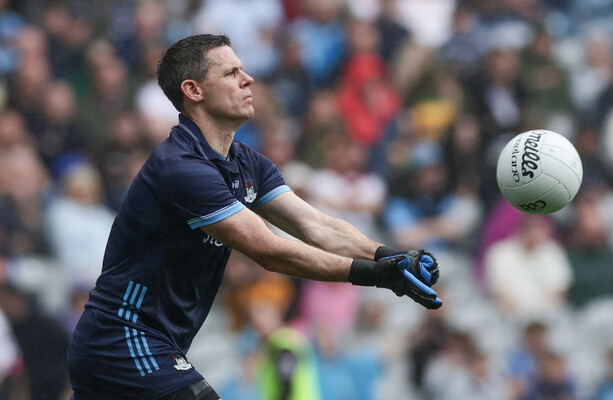Final FRC report proposes review of four-point goal and suggests handpass trial at youth level

The Football Review Committee (FRC) has issued its final report, recommending retention of all the changes currently being deployed on a trial basis as well as tweaking certain rules and recommending a few others – including a new black-card offence. Further review at the end of 2026 is proposed for a number of other initiatives.One interesting recommendation relates to age grades below under-15. It suggests “consideration be given to introducing a rule whereby a player who receives a handpass must kick the ball on their next play". The recommendation continues: “This initiative aims to promote greater use of kickpassing, reduce over-reliance on handpassing and encourage more open and skill-based play at underage levels.”This, presumably, is a response to the relentless rise of the handpass. This season, the handpass-to-kickpass ratio went from 3:4 to 4:4. This was despite FRC hopes that the new rules would lead to fewer handpasses, as the benefits of quick-transfer kickpassing became more evident.Included in the report is the impact on attendances of the improved game. The 2025 championship recording an attendance increase of 20 per cent, rising from 858,459 to 1,029,963.League attendances were also up – for every round except round two – by 9 per cent. Headline figures rose by 131,520 but the numbers are complicated by 2025 being the first year that juveniles (nearly 100,000) were charged into league fixtures.The four-point goal, which was part of the original recommendations and then dropped, has not been revived for debate at special congress. However, it has not been completely discarded.One of the report’s recommendations is that further analysis is required to evaluate the merits of awarding four points for a goal following the conclusion of the 2026 intercounty season.Also down for evaluation at the end of next year is whether a handpassed or fisted score over the bar should be allowed under the current scoring system. Similarly, consideration will be given to whether all handpassing should be with the fist rather than the open hand.The final report also recommends reverting to the original protocols around the clock-hooter timekeeping system.This would end the match as soon as the hooter sounds unless the ball is in flight or a free is awarded, as opposed to allowing one further play. Allowing of a further play was frequently seen this season, including in the All-Ireland final when Kerry held possession at the end of the first half until engineering a two-point scoring opportunity for David Clifford.Two new bodies are suggested, the first of which would be a “Gaelic football expert advisory group” to advise the Standing Committee on Playing Rules (SCPR). It would be comprised of “experienced managers, players, coaches, referees and analysts”.It is also recommended that the Games Intelligence Unit be placed on a permanent footing to gather and collate data – which it has been doing this year – and assist in the evaluation of the rule changes.According to the report: “These structures will ensure that the game continues to evolve in a thoughtful, evidence-based manner, guided by the principles of fairness, enjoyment and excellence.”Among the recommendations for rule tweaks are extending the black card to include jersey-pulling in goal-scoring situations. Currently, the sanction applies exclusively to “deliberately pulling down an opponent or deliberately tripping an opponent with the hand(s), arm, leg or foot”.Other modifications include: penalising early movement by players before 1v1 throw-ins; changing the kick-out mark delay penalty from a throw-in to a free kick; clarifying enforcement of solo-and-go distance; extending penalty awards for cynical fouls in goal-scoring situations to club competitions; clarifying conditions for two-point scores when touched by the opposition; empowering neutral sideline officials to report foul play.As with the four-point goal and fisted point, the FRC recommends analysis of the merits of introducing an “over and back” or back-court rule. This would prohibit a team from moving the ball back into their own half once they have moved it into the opposition half.“Any breach of this rule would result in a free kick awarded from the point where the ball crossed ”back over" the halfway line. The objective is to incentivise teams to press forward and actively seek to regain possession. However, careful consideration is needed regarding how this rule would apply to kick-outs and other transitional phases of play.”In his introduction to the report, GAA president Jarlath Burns paid tribute to the work of the FRC.“It is no exaggeration to state that we have got our game back,” said Burns, “and at intercounty level both the Allianz Leagues and GAA championship as competitions bore this out.“There was a degree of nervousness around how the same rules might apply from the highest level down into our club competitions, but this too has been a huge success, bedding in well and breathing life back into our game amongst the largest cohort that plays it – namely our club players."He went on to say: “The rule changes will now go before Special Congress with a view to having them included in the permanent rules of Gaelic football, and our delegates will ultimately debate associated issues before providing their verdict.“It has been a busy and ultimately productive period for the great game and one that leaves the code in an infinitely better state, a belief supported by the transformation of the national commentary around the game.”The various proposals will be presented to Central Council on Saturday and in all likelihood endorsed for debate at the special congress to be held on October 4th.









